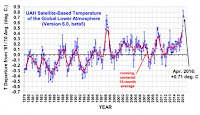This was the hottest four-month start (January to April) of any year on record, according to newly-released satellite data.
The Arctic continues its multi-month trend of off-the-charts warmth. So it’s no surprise that Arctic sea ice continues to melt at a record pace. New research, however, finds that warming-driven Arctic sea ice loss causes high-pressure systems to get stuck in places like Greenland, leading to accelerated melt of the land-locked ice that drives sea level rise worldwide.
Let’s start with the University of Alabama at Huntsville (UAH) satellite data, which show that the lowest part of the atmosphere (the lower troposphere) was an impressive 1.3°F (0.71°C) above the historical (1981-2010) average — a baseline that is itself 0.8°F (0.45°C) hotter than pre-industrial levels.
UAH tempsThe lower tropospheric temperature (LT) anomaly, via UAH scientist Roy Spencer.
April just about tied the record for hottest April in the satellite record (which was 0.73°C). It follows the hottest March, hottest February, and “warmest January in satellite record.”
So it’s easily been the hottest start to any year in the satellite record. Sorry Ted Cruz and other climate science deniers — we are observing human-caused global warming in every single dataset, including the satellites.
This year has also set records for loss of Arctic sea ice.
...
Climate models have always predicted that human-caused warming would be at least twice as fast in the Arctic as in the planet as a whole thanks to Arctic Amplification — a process that includes higher temperatures melting highly reflective white ice and snow, which is replaced by the dark blue sea or dark land, both of which absorb more solar energy and lead to more melting. And that means some winters are going to see truly astonishing Arctic warmth, such as we’ve already observed this year (see my March post, Record-Shattering February Warmth Bakes Alaska, Arctic 18°F Above Normal).
Read more at Arctic Death Spiral Update: What Happens in the Arctic Affects Weather Everywhere Else

No comments:
Post a Comment